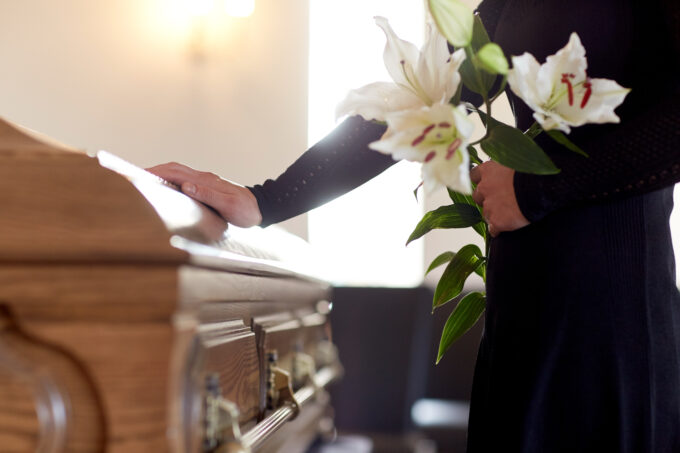How to Write a Eulogy for a Loved One

It’s hard to think clearly after you lose a loved one, which is why being tasked to write a eulogy can seem so daunting and, at times, even impossible.
No matter what may be going through your head right now—you can do this.
In this article, we’ve broken down a eulogy into three parts: introduction, middle, and conclusion, with examples to help guide you.
Writing the Introduction
Start your funeral eulogy by greeting and acknowledging everyone in attendance. Express gratitude for their support and for attending the loved one’s funeral. Introduce yourself and explain how you are related to the deceased.
Example
Here is an example of an introduction to a eulogy:
I want to thank all of you for being here to honor the life of [name of your loved one] and share memories about the many ways she/he enriched our lives. For those who may not know me, my name is [name], and I am the [son, daughter, nephew, etc.] of [your loved one’s name]. As we reflect on the life of [name], I would like to share the beautiful memories I have of [him/her] and what made [him/her] one of the most extraordinary human beings I have ever known.
Try to keep your introduction under two paragraphs. A short eulogy introduction sounds more sincere and meaningful than a longer, less concise introduction.
Writing the Middle of a Eulogy
The heart of your eulogy should contain the following:
- Personal stories and anecdotes highlighting your loved one’s personality, outlook on life, and character strengths.
- Accomplishments, contributions, or personal achievements that showcase their positive qualities. If they were in the military, you may want to include their service ranking.
- Descriptions of how your loved one changed the lives of family members, friends, and their community.
- You can also include a brief history of their life, including their childhood, marriage, children, grandchildren, retirement, etc.
- Share your loved one’s hobbies and interests.
The central section of your eulogy should paint a rich picture of your loved one. You don’t need to worry about getting every single bit of information about your loved one in the eulogy—this isn’t a biography; it’s a portrait of how your loved one impacted you. The entire purpose of your eulogy should be to celebrate your loved one’s life and your memories of them.
Example
Here is an example of what you might include in the central part of your eulogy:
John had an extraordinary gift for putting everyone at ease, no matter who they were! His gentle and caring personality instantly made him friends with everyone. In fact, John never met a stranger! In addition to being an outstanding father and husband, he successfully coached his son’s Little League baseball team for three seasons and won a championship one year. He cherished the moments spent with his two granddaughters, making it a tradition to treat them to ice cream every Saturday afternoon until they finished high school. After dedicating 45 years of his life to Belco Industries, John retired at 65. He often expressed his excitement about retiring to devote more time to his wife, Iris.
Writing the Closing
Conclusions are always the most difficult part of a eulogy. Consider it a way to provide closure and reassurance to the audience. Summarize key aspects of your loved one’s life and personality and emphasize their positive influence.
Putting It Together: A Complete Eulogy
Hello everyone, I am Amelia, Rose’s daughter. Today, we honor my mom, Rose Brighton, who passed away just three months after my dad. It’s been an incredibly tough year for our family, but I thank you for being here to support us through this tremendous loss.
My wonderful mother devoted herself to caring for me, my brothers, and my father. From comforting us when we were sick or hurt to working as an RN at several hospitals to being there when we needed her the most, Mom always put everyone else above herself.
She found joy in life’s simple pleasures. She loved planning family reunions, walking her dog Max, cooking Dad’s favorite meals, and growing vegetables in her garden. Mom also loved her job as a nurse and often took her work home. When she had an extremely ill patient, she would call the hospital during her off shifts and ask how that person was doing. Mom was the most compassionate person I have ever known.
Mom, we knew you loved us so much. I miss you so much already. Your smile and uplifting words of encouragement kept me going during sad or stressful times. If you’re watching us right now, know that we will always remember and love you.
General Tips
Write From the Heart—Your Experience Matters
Don’t think about writing a funeral eulogy. Think about writing a love letter to your loved one and put your thoughts and emotions on paper unfiltered. You can go back and edit it later. For now—write.
Don’t Use AI
A eulogy written by AI will sound stilted and too perfect. A eulogy should sound human and come from the heart.
Focus on the Positive
Nobody is perfect, and you certainly don’t need to paint your loved one as the most perfect human being on the planet. However, you also don’t want to focus on the negative aspects of their life or personality. Sharing humorous stories about your loved one can be relieving, but your goal should be to share what made them such a wonderful person and how they positively influenced your life.
Read It Out Loud
Practice reading your eulogy several times to a “pretend” audience. You may hear something you think needs to be changed that you wouldn’t notice by silently reading the eulogy. Reading it out loud will also give you a sense of your pace and whether you’re reading too slow or fast.
Get Support
If you’re stuck—reach out to family members and close friends for insight. Write what you know first, then reach out if you need help filling in extra details or other accomplishments or contributions you may not have known. If your loved one is receiving multiple eulogies, reach out to the other individuals writing them for support.
Get Additional Support From Wujek-Calcaterra & Sons
Wujek-Calcaterra & Sons is a family-owned and -operated funeral home that has been supporting families in Michigan for four generations. Our friendly team will help you plan a respectable funeral and memorial for your loved one and will support you and your family every step of the way.
Please contact us today, and let us know how we can help you—we’re available 24/7!



